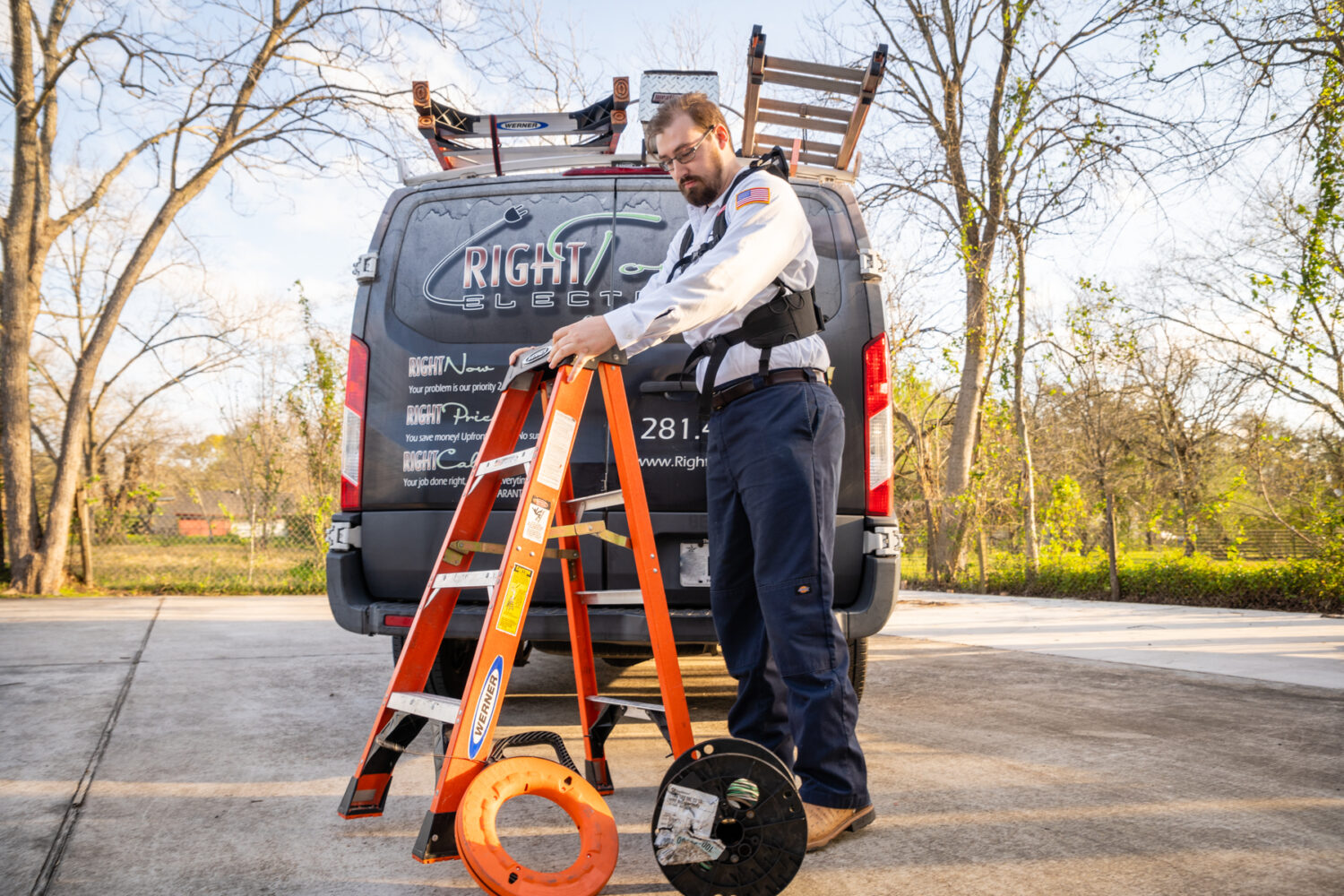As winter approaches, there’s a chill in the air, and the nights are getting longer. From preparing for holiday parties to staying warm on cold days, people tend to use more electricity during this season. You can use the electrical tips in this guide to optimize your energy usage and stay safe throughout the winter.
1. Make Sure You Have Clear Access to Your Home’s Main Electrical Panel
If you experience severe weather over the colder months, your electricity may fluctuate, and this could trip your home’s power switches. You’ll need unobstructed access to the main electrical panel (fuse box) to turn the switches back on. Make sure that you don’t have boxes or anything else in front of the panel that could prevent you from opening it safely. You may want to keep a flashlight near the panel to make it easier to see the switches during a power outage.
2. Check Your Electrical Panels, Plugs, Sockets and Switches
Before winter starts, inspect all of the electrical panels, plugs, sockets and switches in your home. First, make sure that all of your electrical panels are covered. When you check your main electrical panel and circuit breaker, confirm that all of the circuits and switches are correctly marked. After that, make sure that the circuits are functioning properly. If you need assistance, an electrician can help you with labeling the panel and checking the circuits.
Then, move on to checking your home’s plugs, sockets and switches. Look out for any cracks, loose sections or missing screws. If you notice any cracks, missing covers or other potential problems, have these fixed as soon as possible.
3. Examine Your Home’s Wiring
While you’re inspecting your electrical plugs and sockets, take some time to check the condition of the electrical wires. Physical damage, corrosion and aging can cause electrical wires to fray. In some cases, fraying could be a sign of problems with the electrical connections. For example, it could indicate that the electrical connections were not done properly. Frayed wiring may increase the risk of electrical hazards and fires in your home.
If the wiring is frayed or defective, you may notice black spots or burns around the sockets. To stay safe in your home over the winter months and beyond, you should have damaged wiring checked out by professionals. They can repair frayed wiring and complete any house rewiring that may be necessary. When you examine your home’s wiring, you may find that it’s made of aluminum. Copper wiring conducts electricity better than aluminum, and it can handle extra demand from appliances. As you consider your power usage and wiring needs, you may want to ask your electrician whether switching to copper wiring could be beneficial.
4. Have Your Heating System and Thermostat Inspected
To keep your heating system in top condition, you should have it inspected once a year. If you have a service contract with the company that installed your system, you may not need to pay for the inspection. First, the inspector will check your heating system. He or she will make sure that it is functioning properly, and it will be checked for cracks and other signs of damage. This part of the inspection could help to prevent other problems in your home during the colder months.
For example, if your heating unit were to break, your home’s pipes could freeze and burst, leading to water damage in your home. To make sure the inspection is as helpful as possible, always tell your inspector about any problems you’ve noticed with your heating system. The inspector will calibrate your thermostat so that it runs efficiently. If any thermostat defects are found, the inspector will advise you about whether the defects can be repaired.
Since defective thermostats may increase your home’s energy consumption, you should have defects repaired promptly. If your thermostat can’t be repaired, the inspector will help you with getting a replacement. In addition to having your heating system and thermostat inspected each year, make sure that your thermostat has enough battery power. Your heating system could fail if your thermostat’s batteries are dead. To prevent this, it’s helpful to check the batteries every fall.
5. Install Carbon Monoxide Detectors
Carbon monoxide is an odorless gas that can be lethal. Since you can’t detect it on your own, it’s important to install carbon monoxide detectors to stay safe. Ideally, you should have at least one carbon monoxide detector on each level of your home, including your basement. Some states have laws that require carbon monoxide detectors in all bedrooms.
You can purchase carbon monoxide detectors that plug into your home’s electrical outlets. Wall-mounted options are available, too. When you install carbon monoxide detectors, make sure that you place them between knee and eye level. Unlike smoke, carbon monoxide doesn’t rise very much, so this lower-level installation is crucial for proper detection.
6. Check Your Smoke Detectors and Fire Alarms
Most house fires occur during the winter season. To protect yourself, make sure that you have smoke detectors and fire alarms in your home and that they’re working properly. You’ll need to have at least one smoke detector and one fire alarm on each level of your home. In addition, smoke detectors and fire alarms are needed inside and outside each bedroom.
According to recommendations from the National Fire Protection Association, you should do maintenance checks on all of your smoke detectors and fire alarms once a month. If you use battery-operated devices, make sure to replace the batteries regularly. Some models have visual or audio notifications to let you know when the batteries are running low.
7. Consider Purchasing a Whole-Home Generator
Power outages are likely during ice storms or heavy snow. Having a generator allows you to stay warm, keep the lights on and keep the refrigerator working. Portable generators can carry safety risks if they’re not used properly, and they may not provide enough power to keep all of your appliances running.
Whole-home generators are installed by professionals, so they’re much safer to use. As soon as the whole-home generator detects a power interruption, it will start automatically. Whole-home generators can power your HVAC system and all of your appliances, and you won’t have any lapses in heating or other electricity needs.
8. Look Out for Water Leaks
When water makes its way into your electrical outlets, it creates hazardous situations. If an outlet is damp, it may have rust or corrosion, and this prevents the proper flow of electricity. Excess heat is created, and this could cause a fire. Water could cause the outlet to short circuit, potentially producing sparks that might lead to an electrical fire. If you plug something into an electrical outlet that has water damage, you may be electrocuted.
If water from snow or rain enters your home, it could affect your electrical outlets. To reduce the risk of electrical issues due to water leaks, make sure that your windows and doors have tight seals. If you notice any water damage, have a professional check the situation to make sure that your electrical wiring has not been impacted.
When you know that water has entered an outlet, turn off the power to that outlet. If the outlet does not dry out on its own, it will need to be repaired by an electrician.
9. Use Surge Protectors
Whether you’re working from home or enjoying the latest Netflix shows, surge protectors will keep all of your devices running smoothly this winter. Electrical surges are spikes in the electrical current that powers your home. If a surge travels through an outlet in your home and makes its way to your device, your equipment may be damaged.
Surge protectors prevent surges from reaching your devices. Since electrical surges are unpredictable, you should use surge protectors for anything that’s plugged into an electrical outlet in your home, including laptops, washers, TVs and light fixtures. For extra protection and convenience, you may want to ask your electrician to install a whole-home surge protector.
10. Think About Your Lighting Needs
As the winter nights draw in and the days turn gray, the lighting in your home may feel dim and inadequate. Insufficient lighting could negatively impact your mood and productivity. To keep your home feeling cozy and bright throughout the season, you may want to add new light fixtures or use brighter light bulbs. If you have a balcony or a yard, you could consider adding outdoor lighting for extra cheer.
When you select light bulbs for your light fixtures, make sure to choose LED bulbs. These bulbs are much more efficient than other light bulbs. They won’t strain your home’s electricity system or add much to your utility bills. Compared to using incandescent light bulbs, LED bulbs will allow you to have more light in your home for a longer period, and you’ll save money. In addition to looking great inside your home, LED lights are ideal for your outdoor lighting. Unlike other light bulbs, LED lights will provide bright illumination when the temperatures are below freezing. You can rely on them for all of your holiday and seasonal lighting displays.
To create a warm, inviting atmosphere for your home and outdoor space, it’s helpful to choose light bulbs that are labeled as soft white. These bulbs provide lighting that looks natural and comforting, and they don’t have any of the cold glare that can come from brighter lights.
11. Add Additional Power Outlets
With holiday lights, parties and extra cooking, it’s likely that you’ll use more electricity during the winter months. Having lots of devices plugged into outlets, using multi-adapter plugs and relying on extension cords could overload your home’s electrical circuits, and it may trip the breakers. To avoid an overload, you may want to have an electrician add extra power outlets to your home. Extra outlets are particularly beneficial in rooms where you’ve been relying on extension cords or adapter plugs.
Make a plan for how many outlets you’ll need, and think about the locations that would get the most use. For example, you might find that you need more outlets in your kitchen for countertop appliances, or you could benefit from extra outlets in your home office for laptops and monitors.
12. Operate Space Heaters Safely
Space heaters are ideal for times when you just don’t feel warm enough in your home. Whether you’re using a water-filled, ceramic, fan-forced or infrared space heater, safe operation is essential to reduce the risk of fires and other electrical hazards. Always follow the instructions in the owner’s manual, and inspect your space heaters for cracks, chips and other damage on a regular basis. Space heaters should be placed on flat surfaces. You should never place a space heater on a shelf or in a location where it could fall. Ideally, you’ll want to place your space heater on the ground.
When you choose a location for your space heater, make sure that it’s away from doorways and high-traffic areas. You’ll need to keep your space heater at least three feet away from flammable objects, including curtains, fabric and paper. Space heaters should never be covered.
13. Unplug Electronic Devices Before Bed
Energy bills increase during the colder months, so unplugging nonessential devices before bed could help you save money. It may reduce the risk of short circuits and electrical fires. Although you should keep your refrigerators and other appliances plugged in, you can safely unplug your cell phone, laptop and desktop computer every night. In some cases, you may want to unplug your TV.

We hope these electrical tips have helped you prepare your home for the colder months. If you’re looking for an electrician or need additional assistance with seasonal preparations, get in touch with our team at Right Touch Electrical in Houston. We offer home rewiring, panel upgrades, electrical installation, repairs and emergency service. We look forward to helping you with all of your home electrical needs.
